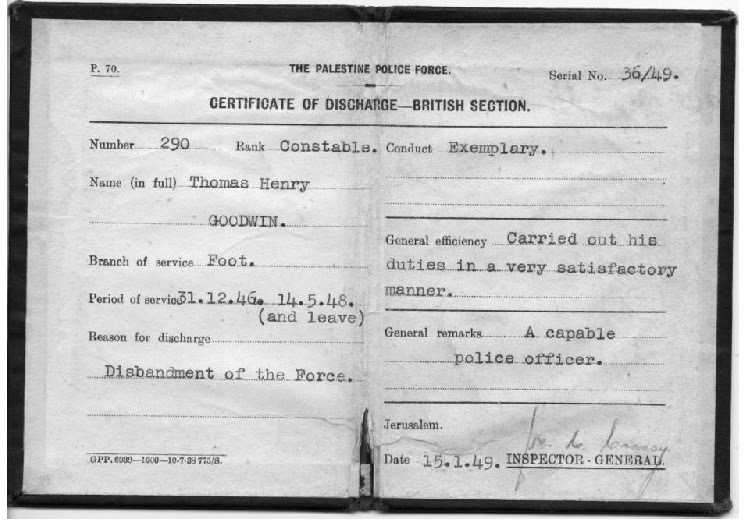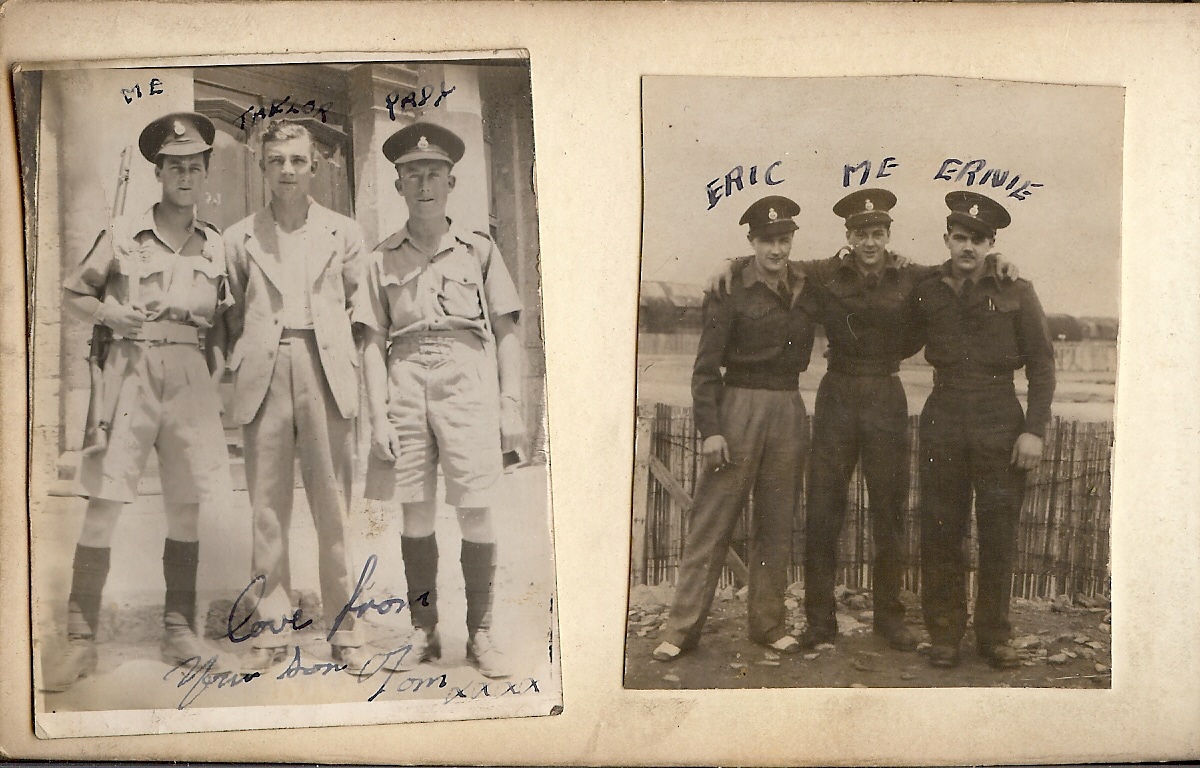The "Good Jailer" Thomas Henry Goodwin
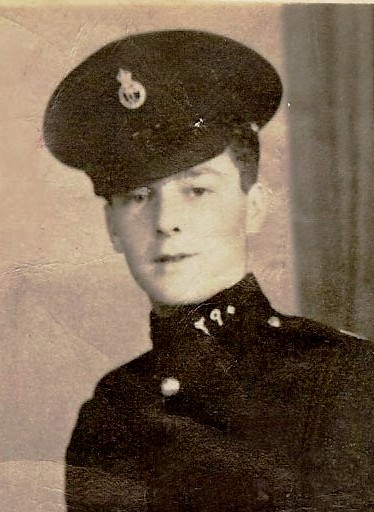 After leaving his home town of Liverpool, England, Thomas Henry Goodwin arrived in
Mandatory Palestine (Eretz Israel) , on December 31, 1946 to serve his country as part of the Mandatory Police.
As his late son, Denis Goodwin, later told my brother, Eliezer Feinstein, he was attracted by the good pay offered for this
kind of difficult job, away from his country and family. Since Thomas liked to wake up quite late, his commander decided to assign him to
the night guard at the Jerusalem Central Prison, where his life came to touch the life of my uncle Meir.
The young and good-natured Goodwin was very different from all the other British guards of the prison. Very soon, Thomas became known by
the Underground prisoners as the "Good Jailer."
After leaving his home town of Liverpool, England, Thomas Henry Goodwin arrived in
Mandatory Palestine (Eretz Israel) , on December 31, 1946 to serve his country as part of the Mandatory Police.
As his late son, Denis Goodwin, later told my brother, Eliezer Feinstein, he was attracted by the good pay offered for this
kind of difficult job, away from his country and family. Since Thomas liked to wake up quite late, his commander decided to assign him to
the night guard at the Jerusalem Central Prison, where his life came to touch the life of my uncle Meir.
The young and good-natured Goodwin was very different from all the other British guards of the prison. Very soon, Thomas became known by
the Underground prisoners as the "Good Jailer."
Eliezer Ben-Ami, who created the oranges with the explosives that Meir and Moshe used to blow themselves up, described the "good Jailer" in his many interviews (available only in Hebrew here). When Meir and Moshe communicated with their fellow prisoners about their Samson operation, they said that whatever happened, they would do their best not to hit Goodwin. Goodwin gave them cigarettes, and talked to them with kindness and respect. [ See the recorded speech of Amnon Rotem, Moshe's nephew]. Since Meir was fluent in English, due to his two and a half years of service in the British army, they quickly developed a good friendship.
On the night of their planned execution, Rabbi Yaakov Goldman visited the two condemned youngsters to offer them spiritual guidance, and to perform the confession service. As Tuvia Goldman (Rabbi Goldman's son) later described, Constable Goodwin, who was standing guard near the cell, could not believe when he saw Meir and Moshe singing the "Adon Olam" prayer with such elation. He told Rabbi Goldman after he had left the condemned men's cell: "I have seen many persons executed here, but I have never seen persons behaving like this before their execution." The Rabbi responded, "This is how only the pure and innocent youngsters, who have never sinned, can behave."
When Meir was captured by the British, my father, Binyamin, bought him a small Bible book that was very popular at the time. It included a replica of the works of the great French artist Gustave Doré, and it was called in Hebrew, The Bible in Pictures. The book was small enough to be approved by the British for delivery to Meir's cell. Meir was very fond of this book, and it seems that he and Moshe were looking frequently at page 45, which exhibits "The Death of Samson".
When Meir and Moshe realized that Rabbi Goldman planned to be with them during their hangings, they knew that they would not be able to kill their British executioners while blowing themselves up, as they did not want to risk killing the Rabbi. Their only available target could have been Goodwin, who was guarding them. That was out of the question too. So Meir called Goodwin, took his Bible and wrote the following dedication on the first page:
"In the shadow of the gallows, 21.4.47. To the British soldier as you stand guard. Before we go to the gallows, accept this Bible as a souvenir and remember that we stood in dignity. It is better to die with a weapon in your hands than to live with hands raised. Meir Feinstein"
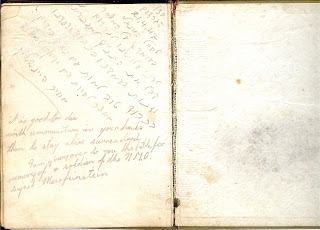
A close up view of the dedication to Thomas Henry Goodwin by Meir.

My brother Eliezer Feinstein holds the Bible on the dedication page near the grave of Meir Feinstein.

The Bible was often opened at page 45, with the illustration of "The Death of Samson." (left)
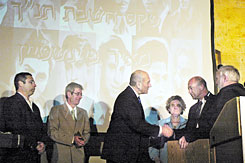 Ehud Olmert, the Prime Minister of Israel, shakes the hand of Goodwin's son, Denis Goodwin.
Goodwin's wife, Mrs. Amy Goodwin, stands between Denis and the Prime Minister. My brother Eliezer Feinstein is holding
the small Bible (to the left of the Prime Minister).
Ehud Olmert, the Prime Minister of Israel, shakes the hand of Goodwin's son, Denis Goodwin.
Goodwin's wife, Mrs. Amy Goodwin, stands between Denis and the Prime Minister. My brother Eliezer Feinstein is holding
the small Bible (to the left of the Prime Minister).
